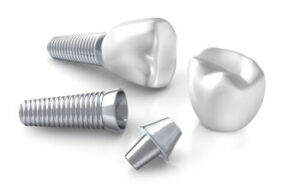When it comes to replacing missing teeth, dental implants have emerged as a leading solution, and for good reason. These aren’t your average tooth replacements; they represent a significant advancement in dental technology. More than just filling the space left by a lost tooth, dental implants play a crucial role in maintaining the health and integrity of your jawbone, which is essential for overall oral health. There’s a growing interest in dental implants in Australia, particularly concerning dental implant cost. Let’s dive into this topic to gain a clearer understanding.
Understanding Dental Implants: A Closer Look
So, you’re considering dental implants. It’s a significant decision, and it’s only natural to want to understand everything about this option. What are dental implants, exactly? How do they function? Why do dentists often recommend them as the best solution for lost teeth? We’re here to demystify dental implants in plain, easy-to-understand language, particularly for us Aussies. Let’s delve deep into the details and unravel the specifics of dental implants.
What are Dental Implants?

- The Implant: A screw-like structure inserted into the jaw bone, acting as a root for the artificial tooth.
- The Abutment: A connector placed on top of the single dental implant to hold and support the crown.
- The Crown: The part of the implant that resembles a natural tooth, usually ceramic or porcelain, for durability and aesthetic appeal.
How Do Dental Implants Work?
Integration with Jaw Bone: One of the most significant advantages of dental implants is their ability to integrate with the jaw bone – a process known as osseointegration. This integration provides a stable base for the new tooth and helps preserve the jaw bone’s integrity, preventing the bone loss commonly associated with missing teeth.
Longevity and Maintenance: Titanium dental implants are renowned for their longevity. With proper care and maintenance, including regular dental check-ups, good oral hygiene, and avoiding damaging habits such as smoking, these implants can last for many years, often a lifetime.
Why Choose Dental Implants?
Mimicking Natural Teeth: Dental implants are the closest you can get to natural teeth regarding functionality and appearance. They allow normal eating, speaking, and smiling without worrying about slipping or moving, a common issue with dentures.
Oral Health Benefits: Besides replacing missing teeth, dental implants are crucial in maintaining overall oral health. They prevent the adjacent natural teeth from shifting, a common occurrence when a gap is left unfilled. Moreover, unlike bridges, dental implants do not require alteration to the neighbouring teeth, thus preserving more of your natural teeth.
Psychological Impact: The impact of dental implants extends beyond just physical benefits. A complete, healthy smile can significantly boost self-confidence and improve overall quality of life.
Advanced Options in Dental Implants
Mini Dental Implants: These are a smaller version of traditional dental implants, used primarily when the jaw bone is insufficient to support standard implants. They are less invasive and can be a more affordable option for some patients.
Innovations in Implantology: The field of dental implantology is continually evolving, with new technologies and techniques being developed to enhance success rates and patient comfort. Digital imaging, 3D printing, and advanced materials are some innovations that make dental implants more accessible and efficient.
Remember when losing a tooth meant you had limited options – maybe a bridge or dentures? Fast forward to today, and we’ve got something pretty amazing called dental implants. These aren’t just a step up in dental care but a giant leap forward. They’re tough, look and feel like your teeth, and do a great job. It’s incredible to think about how far dental science has come, giving us choices we wouldn’t have dreamed of just a few decades ago.
Starting Costs of Dental Implants: A Detailed Overview
When embarking on the journey of dental implant treatment, a crucial aspect for patients is understanding the financial commitment involved. It’s important to note that Australia’s dental implant cost varies widely, influenced by numerous factors. This section aims to unpack these costs, providing a clearer picture for those considering this life-changing procedure.
Initial Assessment Costs
Consultation and Diagnostic Tests: The first step towards dental implants is a comprehensive dental examination. This often includes X-rays and, in some cases, 3D imaging to assess the health of your jaw bone and oral tissues. These initial consultations and diagnostics costs can vary, but they are essential for creating an accurate treatment plan.
Breakdown of Dental Implant Costs
- The Implant Itself: The core of the expense comes from the implant—typically a titanium post. The cost per implant can vary depending on the brand and quality.
- The Abutment and Crown: Following the implant, the abutment and crown are the next significant expenses. These are custom-made to fit your mouth and match your natural teeth, contributing to the cost.
- Supplementary Procedures: In some cases, additional procedures like bone grafting or sinus lifting are necessary to prepare your mouth for implants. These procedures add to the overall cost.
Factors Influencing Cost
Quality and Material of Implants: The choice of materials (like titanium dental implants) and the brand can significantly impact the price. High-quality materials typically command a higher price but offer better longevity and biocompatibility.
Dental Professional’s Expertise: The experience and expertise of the dental professional performing the implant surgery can also influence the cost. Professionals may charge more, but their expertise can be crucial for complex cases.
Location of the Clinic: Geographic location plays a role too. Due to higher operational costs, dental clinics in metropolitan areas might charge more than those in regional areas.
Insurance and Payment Options
Health Insurance Coverage: In Australia, some health insurance plans may cover part of the cost of dental implants, especially if the procedure is deemed medically necessary. It’s important to check with your insurance provider.
Payment Plans: Many dental clinics offer payment plans to make the cost more manageable. This can involve spreading the payment over several months or even years.
Understanding the starting costs of dental implants is essential for anyone considering this procedure. While the initial investment might seem significant, the long-term benefits of dental implants – improved oral health, comfort, and confidence – make it valuable. Always consult a dental professional to get an accurate estimate tailored to your needs and circumstances. Remember, every smile is unique, and so is every dental implant procedure.
Starting Costs of Dental Implants: A Comprehensive Breakdown
Embarking on the path of dental implant treatment involves a commitment to improving oral health and an understanding of the financial investment required. In Australia, the cost landscape for dental implants is diverse and influenced by various factors. Here, we delve into the starting costs and elements that shape the overall expenditure, presented in a human and professional tone.
Initial Assessment Costs
Consultation Fees: The journey to dental implants begins with an initial consultation. This typically includes a thorough dental examination, potentially involving X-rays or 3D imaging. The cost for these initial consultations and diagnostic tests can start from AUD 50, varying based on the clinic and the complexity of the individual case.
Basic Cost Elements of Dental Implants
1. Cost of the Implant:
The titanium implant post, which forms the foundation of the procedure, can start from around AUD 1,500 per implant. The brand and quality of the material used influence this cost.
2. Abutment and Crown Expenses:
On top of the implant, the abutment and crown significantly contribute to the cost. These custom-made components can start from AUD 500, depending on the materials and customisation required.
3. Additional Procedures:
Bone grafting may be necessary for some patients, starting anywhere from AUD 300.
Insurance and Payment Plans
Health Insurance Considerations: In some cases, Australian health insurance plans may cover a portion of dental implant procedures, especially if they are deemed necessary for medical reasons.
Flexible Payment Options: Many dental clinics now offer structured payment plans, allowing the cost to be distributed over time making the treatment more accessible.
Grasping the starting costs of dental implants is crucial for those considering this transformative dental solution. While the upfront costs may appear substantial, the long-term benefits – such as improved oral health, functionality, and aesthetics – make it a worthwhile investment. It’s important to have a detailed consultation with a dental professional to obtain an accurate cost estimate based on your specific dental needs. Remember, each dental implant journey is unique, and so is its financial commitment.
The Cost Factors of Dental Implants
Let’s talk about what’s on everyone’s mind when they consider dental implants: the cost. It’s not a one-size-fits-all deal; the price tag can swing slightly depending on a few key things. It’s like when you’re car shopping – the final cost depends on the make, model, and extra features you choose. Similarly, a few important factors affect how much you’ll pay for dental implants.
Breaking Down the Types of Dental Implants
Traditional Dental Implants:

Mini Dental Implants:
Mini dental implants are available. Think of these as the compact version of the traditional ones. They’re smaller, less hassle, and a good pick if your jaw bone is playing hard to get or you just need something less invasive.
Additional Procedures:
Sometimes, a bone grafting might be necessary to strengthen the jaw bone before implant placement. This additional step can affect the overall dental implant costs.
Number of Teeth Implants:
The cost also varies depending on whether you need a single or multiple teeth implant. Naturally, more implants mean higher costs.
The Investment in Oral Health
Investing in affordable dental implants is not merely a financial decision; it’s an investment in one’s oral health and overall well-being. In this section, we explore the multifaceted benefits of mouth dental implants, emphasising their role in oral health and quality of life, presented in a human and professional tone suitable for an Australian audience.
Long-Term Oral Health Benefits
Preservation of Jaw Bone Integrity: One of the most significant advantages of dental implants is their role in preserving jaw bone health. When a tooth is lost, the jaw bone that supports it begins to atrophy due to lack of stimulation. Dental implants, particularly titanium dental implants, integrate with the bone, providing necessary stimulation and preventing bone loss.
Prevention of Adjacent Teeth Shifting: Missing teeth can shift adjacent teeth, disrupting the natural alignment of your bite. This can lead to many issues, including difficulties in chewing and a higher risk of tooth decay. Dental implants fill the gap, maintaining the integrity of your dental arch and bite.
Enhanced Oral Hygiene: Unlike dentures requiring special care, dental implant surgery can be cared for just like natural teeth. This simplicity in maintenance encourages better oral hygiene practices, contributing to overall oral health.
The Long-Term Benefits of Choosing Dental Implants
So, when weighing whether dental implant treatments are worth it, remember it’s not just about the dollars and cents. It’s about your health, how you feel about yourself, and how you enjoy life. Sure, they’re a big step forward in dental tech, but more importantly, they’re a big step towards a happier, more confident you. And if you’re thinking about it, have a yarn with your dentist. They’ll help you determine if they’re the right fit for your lifestyle and smile.
Payment and Insurance Options
Understanding dental implant treatment costs can be daunting. However, some dental practices in Australia offer payment plans to make the process more affordable. Additionally, some health insurance plans may cover some of the cost, especially if the procedure is medically necessary.
Conclusion

Dental implants signify a commitment to restoring missing teeth and embracing a future where your smile is as healthy as it is radiant. They offer a durable and harmonious solution with the natural function of your teeth, ensuring that your investment today pays dividends in the form of a healthier, more confident you for years to come.
If you’re considering dental implants or have any questions about how this treatment can benefit you, we encourage you to reach out for a personalised consultation. Contact Cross Road Dental at (08) 8004 5137. Our dedicated professionals are here to guide you through every step of your journey towards a brighter, healthier smile. Don’t wait to take this important step in improving your oral health and quality of life. Call us today!
References:
https://www.healthdirect.gov.au/dental-implant
https://www.medicinenet.com/dental_implants/article.htm

